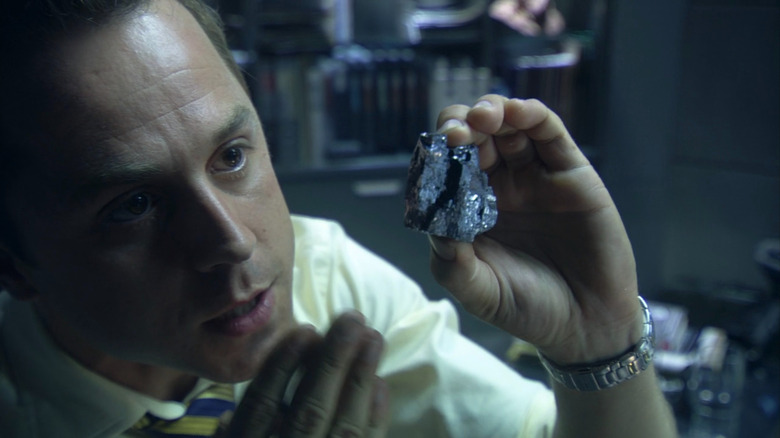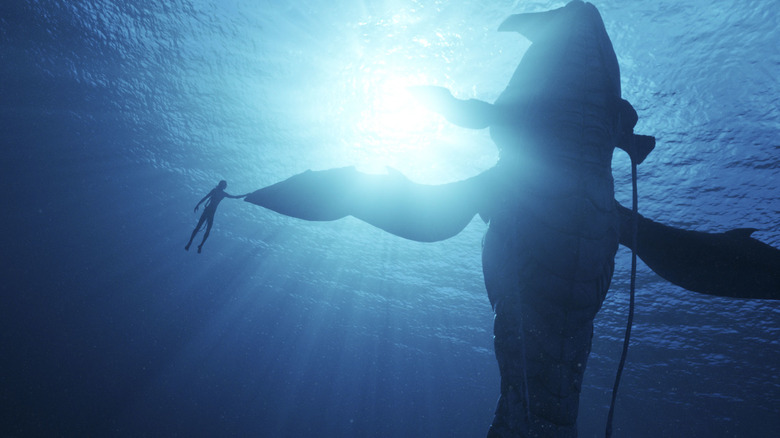It's The Word We Don't Hear In Avatar: The Way Of Water That Speaks Volumes
Contains spoilers for "Avatar: The Way of Water"
At its core, the "Avatar" franchise is an outlandish science fiction fantasy. With its bizarre bevy of colorful creatures and fantastical vistas, the world of Pandora undeniably embraces its strange concepts and finds exciting ways to expand upon them continuously. However, the franchise's way of presenting these larger-than-life ideas alongside its social commentary remains most intriguing, even if it's far from the first sci-fi flick to do this. One of these attempts to connect the franchise's wondrous settings to a real-world dilemma is with the special compound Unobtanium. In the first "Avatar," we learn that Unobtanium acts as a powerful superconductor, which those on Earth seek to use as a power source, given the energy crisis they are experiencing. However, the Na'vi people forbid the mining of it, as they view the Tree of Souls, where it is located as a sacred place. The environmental metaphor may be pretty on the nose, but it is nevertheless an integral part of the story "Avatar" tries to tell about our inner connection with nature and how far we are willing to fight for it.
So it's all the more surprising that the film's sequel, "Avatar: The Way of Water," never mentions Unobtanium. That's right, the very element that caused the central conflict in Pandora's history is not given a single mention in "The Way of Water." So what does the absence of this crucial substance mean for the greater "Avatar" story moving forward?
The Way of Water doesn't fully abandon the idea of precious materials
The term Unobtanium is not present in "Avatar: The Way of Water," but that doesn't mean the idea behind the substance is lost. The film sees Colonel Miles Quaritch (Stephen Lang) return in an Avatar body to take down Jake Sully (Sam Worthington) and his family. When Sully decides to move his family beyond the outskirts of their forest home, they join the Metakiyna tribe of the ocean, who teaches the family their ways. Amongst the most crucial aspects of the Metakiyna way of life comes their connection to the whale-like creatures, the Tulkuns. The people hold the intelligent creatures in extremely high regard, seeing them as siblings and forming lifelong connections with the animals from birth. In an attempt by Quaritch and his band of goons to lure Sully from hiding, they team up with a ship of Tulkun hunters who help kill the animals to cause distress to the Metakiyna clan.
However, after killing the animals, the hunters drill into their heads and take out a gloppy liquid that is incredibly valuable, with even a small canister worth millions. In this way, the Tulkuns stand in as a similar piece of symbolism that the Unobtanium did in the first film as a precious natural resource that humanity seeks to exploit. It serves the message here, but even more significantly, it paints a picture of what we can expect in the franchise's future.
There will always be resources to protect on Pandora
The use of the word Unobtanium, or the lack thereof, might confuse viewers coming into "Avatar: The Way of Water." As an essential plot point of the first film, it seems natural that its long-awaited sequel finds new ways to expand and build upon what we already know about the valuable substance. But just as "The Way of Water" explores new and exciting lands in Pandora instead of staying in the same place as its predecessor, how the film chooses to evolve in its thematic nature is also fascinating to observe.
Keep in mind that "The Way of Water" takes place more than a decade after the first film's events. In that time, the energy crisis on Earth has likely taken over or, if not, is very close to doing so. Is Unobtanium still strong enough to solve the issue? Even if it proves powerful, it's more than likely that Colonel Quaritch and his gang will find similarly valuable resources throughout Pandora and find some way to exploit them for their own use. The war against humanity is about more than protecting the Na'vi people and the life on Pandora, but the heart and soul of the planet itself that keeps everything in check. "The Way of Water" tells us that there is no one little piece that matters as much as it is the entirety of the world that deserves saving.


